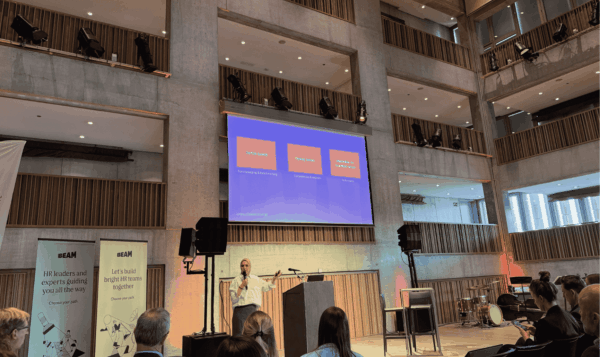Beam Book. Your space to reflect, focus and grow.
Order your copyHR Research
Disconnecting from Work: A Skill We Can Learn

A few weeks ago, our team spent two days by the sea. With walks and time away from screens, the change of scenery helped us slow down, reflect, and disconnect. I genuinely felt the value of it, also physically, and realized I should do this more often. It stayed with me.
Disconnecting sounds simple. But for many people in HR or leadership roles, it’s anything but.
We talk about healthy boundaries. We encourage others to take time off. But when it’s our turn to step away, it doesn’t always happen.
I used to see this as a personal thing, a matter of discipline or habit. But it turns out: disconnecting from work isn’t just a choice. It’s a skill. One that people can learn, practice, and get better at, especially with the right support.
Can people actually get better at switching off?
In 2021, a group of researchers conducted a meta-analysis (Karabinski et al.) of 30 different programs designed to help people mentally detach from work. The participants? Over 3,700 people across various jobs.
And yes, the programs worked. On average, people felt more rested, less tense, and more able to focus again.
But here’s what made the biggest difference:
- programs helped people shift how they looked at stress, not just avoid it, but see it differently
- they lasted longer or gave people repeated, structured moments to pause and practice
- and they worked best for people who were already running on empty, those with poor sleep, fatigue or stress symptoms
In short: disconnecting is harder when you need it most, but also more worth investing in.
So what does that mean for work?
It’s easy to think of disconnecting as just turning off your notifications or avoiding late-night emails.
But often, the real challenge is internal: how to shift your focus when work thoughts keep popping up.
Sometimes people need clarity about their role. Sometimes they need permission to let go. Sometimes it helps just to see others doing it, too.
What matters most is not the tool, but the context. Do people feel safe enough to switch off? Do they know someone’s got their back while they’re away?
A good time to try
If you’re reading this in July, your holiday might be just around the corner.
So here’s something to think about, for yourself, or for your team:
- What would make your time off feel truly restful this year?
- What would help your colleagues disconnect with peace of mind?
- And what small change could you make, so it becomes a little easier for others to follow?
Disconnecting isn’t about doing less. It’s about making room to breathe, so you can return with more space to think, support others, and do the work that matters.
And like any skill, it gets easier when we practice it together.
References
Karabinski, T., Haun, V. C., Nübold, A., Wendsche, J., & Wegge, J. (2021). Interventions for improving psychological detachment from work: A meta-analysis. Journal of Occupational Health Psychology, 26(3), 224–226. https://doi.org/10.1037/ocp0000280



